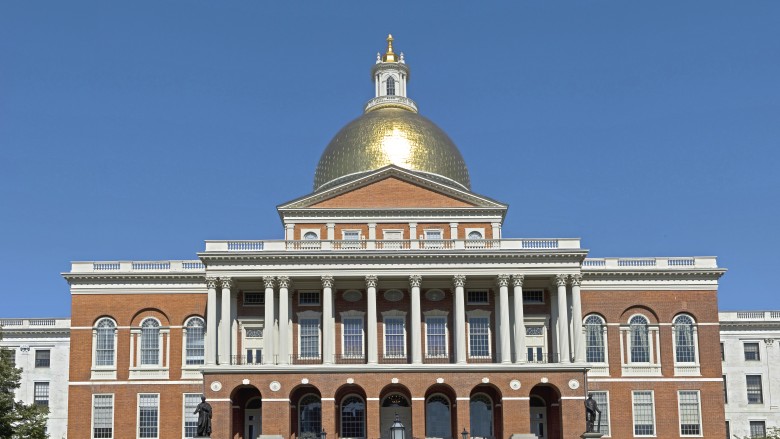Budget deficit may reach $370 million this year
By State House News Service | June 14, 2016, 14:51 EDT
 Massachusetts budget negotiators got some disheartening news Tuesday as new budget gaps emerged. (Photo courtesy of Wikipedia.org)
Massachusetts budget negotiators got some disheartening news Tuesday as new budget gaps emerged. (Photo courtesy of Wikipedia.org) BOSTON – Dealing a severe blow to legislative negotiators charged with reaching a state budget accord this month, the Baker administration disclosed Tuesday this year’s state budget hole has grown larger and may reach $370 million, while estimates of revenues available for next year’s budget might be off by as much as $750 million.
The administration filed an updated financial disclosure statement on Tuesday predicting for state investors that tax collections will finish the current budget year $320 million to $370 million below benchmarks, and expected tax revenues for fiscal 2017 are now likely to run $450 million to $750 million below the expectations that Baker and the House and Senate budget writers have been using all year.
While the administration continues to have confidence that it can manage through the tax revenue shortfall for the current budget year without layoffs, emergency cuts or the use of reserve funds, Administration and Finance Secretary Kristen Lepore urged lawmakers to carefully consider spending as it negotiates a final fiscal 2017 budget. The House and Senate have each approved fiscal 2017 budgets of roughly $39.5 billion, which were drafted with the expectation that tax collections would rise by $1.1 billion.
“While the state’s economy remains healthy, we now expect Fiscal Year 2017 tax revenue to come in lower-than-expected primarily due to the below-benchmark tax revenue collections in Fiscal Year 2016. As the budget process wraps up, it is important for the administration and our partners in the legislature to remain proactive and make adjustments in spending in line with expected revenues,” Lepore said in a statement.
Stung by sluggish collections in April and May that fell well below benchmarks and opened a $311 million hole in the current budget with just one month left on the fiscal year, lawmakers have acknowledged the need to be careful as they craft a budget for next year.
The conference committee – led by Rep. Brian Dempsey and Sen. Karen Spilka – met for the first time last Friday to begin negotiations over a final spending plan for next year.
Both branches of Legislature passed budgets built on revenue projections agreed to in May that anticipated 4.3 percent growth next year, but now may have to use the limited discretion they have to adjust line-item spending to account for the new projections.
Attributing the shortfall to lower investment returns, stock market volatility and “safe harbor rules” that allow filers to estimate 2016 payments based on actual 2015 tax bills, the administration said Massachusetts is not alone in feeling the budgetary impacts of the broader economic trends, but insisted the state is in a “relatively better position.”
The administration said income and sales tax collections “remain healthy.”
Dominick Ianno, chief of staff for the Executive Office of Administration and Finance, told mayors and municipal administrators on Tuesday at a State House meeting that the economy is “not growing maybe as fast as we thought.”
Referring to the fiscal 2017 tax revenue shortfall that could approach $750 million, Ianno said, “That’s a big number and we have a budget process we’re still going through with the Legislature.”
Lepore convened a private summit of Bay State economists and experts last Monday to examine the undercurrents that led to tax collections in April and May falling below the Baker administration’s expectations. Just this past January, Gov. Baker made about $50 million in midyear spending cuts, but the administration also increased its tax revenue estimate for fiscal 2016 by $140 million.
While state tax collections are slumping, Secretary of State William Galvin’s office reported last week that revenues produced by his office are up. Office revenues of nearly $310 million over the first 11 months of fiscal 2016 are about $6 million ahead of projections and more than $32 million ahead of the comparable period in fiscal 2015.
Revenues from securities division fines and penalties are up, Galvin said, and greater activity in the housing market and higher home prices have led to increased revenues from Registries of Deeds.
“This is a revenue-producing office, and while tax revenues were lower than expected for the state last month, revenues in this office are up,” Galvin said in a statement.
A breakdown of year-to-date office revenues requested by the News Service showed $81.5 million associated with excise tax stamps, more than $57.6 million dealing with recordings, $53.9 million associated with limited liability corporation annual payments, $16.1 million in annual report payments, $33.7 million in collections tied to mutual funds, and $16.35 million pertaining to broker dealers.
Written by Matt Murphy










